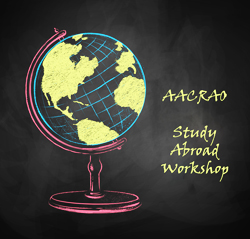
With a directed focus on the expansion, accessibility and diversification of U.S. study abroad through initiatives such as IIE Generation Study Abroad and USA Study Abroad, there has been a continued increase in the number of U.S. students participating in study abroad opportunities, as well as an increase in the number of U.S. institutions that have begun to include study abroad as part of degree and certificate programs.
As this growth is expected to continue, it becomes more and more important that all professionals at the institutional level who work with study abroad students and records, be informed as to best practices when it comes to study abroad program review, accurate record-keeping, and the management of student expectations, so that we are helping to ensure that U.S. students gain the most from their study abroad experiences.
Best practices workshop
The AACRAO Summer Study Abroad Workshop, which took place in Washington D.C. on June 29 and 30, 2016, was an opportunity for study abroad professionals from both the U.S. and Canada, whose roles working with study abroad rage from Study Abroad Advisor, Study Abroad Transfer Coordinator, Registrar to Associate Director of International Programs, to come together to discuss issues when working with study abroad programs and international academic records, and to offer solutions. The workshop was hosted at the National Center for Higher Education, and presented by Opal Leeman Bartzis, Ed.D., VP of Academic Affairs ISFA-Butler University and Annetta Stroud, Ed.M., Senior Evaluator AACRAO International Education Services
The first section of the workshop focused on an overview of common study abroad models, including program providers, faculty-led, short-term, and hybrid models. Characteristics of each model were discussed, as well as the different approaches to the documentation, as well as the determination and application of credit, whether it is through a School of Record, direct and residence credit, or the evaluation of international transcripts.
The second section of the workshop focused on utilizing a set of best practices when reviewing international study abroad programs and the evaluation of international academic records, in order to effectively determine the recognition status of the host institution and academic level of the program, and calculate grade averages and possible transfer credit. Participants were able to actively apply the set of best practices to the evaluation of study abroad programs in the third section of the workshop, which included seven case studies of study abroad programs, spanning seven countries. The Resource Packet provided to participants supplied the necessary country information (an overview of the educational system, recognition body, benchmark credentials, and default grade scales) to enabled a systematic approach to be followed for international program review and the calculation of grades and transfer credit.
Best Practices for the review of study abroad programs and international academic records include:
- Determine the program of study (direct enrollment, study center,part-time, full-time, etc)
- Review the educational system of the country where the host institution is located, including benchmark credentials, default grade scales
- Confirm the host institution is recognized by the appropriate body (Ministry of Education, etc)
- Research program and course details, including entry requirements, level of study and grading scale
- Apply basic transfer credit methodology to determine possible advanced standing credit
- Understand your domestic institutional transfer policies and fairly apply them to study abroad programs (transfer of 'D' grades, acceptable credit vs applicable credit, etc)
Communication is key
The diversity of the roles of participants and the engaging discussions at the AACRAO Summer Study Abroad Workshop demonstrated the necessity of communication and cooperation of all professionals at the institutional level who work with students studying abroad, specifically when it comes to determining the validity of international study abroad programs and the approach to transfer credit.
“The AACRAO Study Abroad Workshop was so valuable! The presenters were very knowledgeable, facilitated great conversations, and really utilized the time well. The amount of value included in such a short workshop far exceeded my expectations. I came away with a more thorough understanding of best practices for handling study abroad credit. Upon return to my office, I was able to immediately implement some of the tips, ideas, and practical advice that came out of the two days," said Caitlin M. Dooley, MPA, Study Abroad Academic Advisor, Office of Study Abroad, Florida International University. "Bringing together professionals from both international education and registrars’ offices allowed for unique exchanges and conversations about the many aspects involved in the study abroad process. I really appreciated being able to have conversations with others who also deal with the unique challenges and difficulties involved in implementing study abroad programs.”